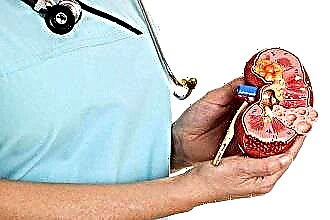Under the influence of high renal pressure in the body, all processes are disrupted. Complications can be very serious: heart and kidney failure, vascular atherosclerosis and many others. A negative effect on other organs can lead to disability or even death.

What's this?
The symptoms and treatment of kidney pressure depend on many factors. Even young people are susceptible to this pathology. Only a doctor can find out the cause and eliminate the disease itself; it will not be possible to cope with the situation on its own.
Arterial hypertension is considered one of the most common ailments, but few people know that the kidneys are often involved in the onset of the disease. Disruptions in the activity of this organ directly affect the blood pressure indicator. Doctors call this disease "renal hypertension". The relationship between kidney and blood pressure is very close. The renal department's job is to regulate fluid levels in the body and to remove harmful and toxic substances from the body. If the kidneys do not do their job well, pressure builds up in the circulatory system.
In addition, renal pressure may be below normal, which also indicates the presence of pathology in this area of the body. In this case, the level of water in the body is below normal, there is a slight degree of dehydration.
Renal hypertension is not considered an independent disease. This condition develops under the influence of certain pathological factors that have a destructive effect on the kidneys. This situation provokes a malfunction of the organ, as a result of which there is a decrease in blood flow, sodium and water retention in the kidneys, resulting in edema. The accumulation of sodium ions leads to swelling of the vascular walls, increasing their sensitivity.
For this reason, receptors in the organ actively produce an enzyme called renin. After certain pathological transformations, this substance affects the tone of the vessels, reducing their permeability, which will inevitably lead to an increase in pressure in this area.
Treatment for renal hypertension depends on the type of disease. In one course, medications can help, while in the other, only surgical intervention is necessary.
Classification of renal hypertension:
- Parenchymal. It appears as a consequence of nephrogenic pathologies that cause damage to the vascular tissue of the kidney parenchyma, as well as the glomeruli of the organ.
- Vasorenatal. It occurs when the arteries of the kidneys are destroyed, which is the cause of poor blood supply to this area. It can be acquired and congenital.
- Mixed. It is diagnosed when the first two types of pathology are combined and is considered the most dangerous form of the disease.
In half of the patients, parenchymal renal hypertension is found, this type of disease is the most common. The consequence of this ailment can also be its progression, as a result of which the tissue of the kidney itself dies, and the substances that regulate vascular tone are synthesized in smaller quantities. However, more often this development of the situation concerns elderly and senile people.
Causes
The causes of this disease directly affect the therapy that the doctor chooses. Without eliminating the provoking factors, it will not be possible to improve the prognosis of such patients.
Why does it arise:
- Inflammatory pathologies (pyelonephritis, glomerulonephritis).
- Anomalies in the development of the organ and urinary tract, congenital genesis (hydronephrosis, polycystic, kidney dystopia and others).
- Diabetes mellitus, in which the organ's microcirculation system is damaged.
- Systemic diseases that cause kidney damage (SLE - systemic lupus erythematosus, vasculitis).
- Atherosclerotic changes in the organ, narrowing of the arteries of the kidney, congenital or acquired.
- Large stones in the kidneys and urinary tract, tumor processes in this area.
The narrowing of the arteries leads to an increase in pressure in the organ, since the blood is delivered in insufficient volumes. If such a problem occurs, the kidneys begin to store water, which increases the amount of circulating blood, and therefore an increase in the pressure indicator. Stenosis of the renal vessels and arteries often provokes the appearance of atherosclerosis, and this directly affects the patency of the coronary arteries, so a heart attack can be a consequence of such a pathology.
Symptoms
The manifestations of renal hypertension are not always noticeable, especially if the disease is at the first stage of its development. Sometimes a person may feel slight ailments, but do not associate them with the illness. When the blood pressure readings start to rise significantly, the symptoms also become brighter. This:
- Dizziness.
- Pain in the head, frequent migraines.
- Excessive sweating.
- Pain in the lumbar spine.
- Increased body temperature.
- Tachycardia.
- Increased fatigue, loss of strength, weakness.
- Frequent urge to urinate.
- An increase in the volume of excreted urine by half.
The main sign of this pathology is a constant increase in blood pressure, which is almost impossible to bring down completely. The drugs usually prescribed for hypertension do not help well. Therefore, the doctor raises the issue of renal pressure.
 When, under the influence of this disease, kidney tissue is significantly destroyed, more severe symptoms may appear: clouding and loss of consciousness, disruptions in the functioning of the gastrointestinal tract, diarrhea, vomiting. Among other things, hemorrhages in the retina of the eyes are often observed, which can lead to serious disorders of visual function. All signs of high renal pressure are similar to the manifestations of arterial hypertension, so it is important for the doctor to correctly diagnose the disease.
When, under the influence of this disease, kidney tissue is significantly destroyed, more severe symptoms may appear: clouding and loss of consciousness, disruptions in the functioning of the gastrointestinal tract, diarrhea, vomiting. Among other things, hemorrhages in the retina of the eyes are often observed, which can lead to serious disorders of visual function. All signs of high renal pressure are similar to the manifestations of arterial hypertension, so it is important for the doctor to correctly diagnose the disease.
Diagnostics and therapy
The symptoms and treatment of renal hypertension require careful diagnosis. The doctor prescribes a complete examination for the patient to identify this ailment.
Diagnostic methods:
- Complete blood count (CBC).
- Blood chemistry.
- General urine analysis (OAM).
- Blood and urine tests from the renal vein to determine the presence of an enzyme that increases blood pressure.
- Urography.
- Organ biopsy.
- Radioisotope radiography.
- Ultrasound examination of the kidneys.
Based on the diagnostic results, the doctor selects the optimal therapy. Sometimes you can only help with surgery. Treatment of renal pressure includes the normalization of blood pressure and, in parallel, therapy of the diseases that caused this ailment. Medicines are the main therapy.
Drug groups and common representatives:
| Diuretic drugs | "Furassmid" intravenously (in severe disease), tablets: "Veroshpiron", "Hypothiazid", "Aldactone". |
| Alpha blockers | "Butyroxan", "Prazosin". |
| Beta-blockers | Metoprolol, Egilok, Bisoprolol. |
| APF | Captopril, Enalapril, Lisinopril. |
| Sartans | Irbesartan, Valsartan, Losartan. |
In addition, the doctor may prescribe the intake of calcium antagonists in the form of "Verapamil" or "Amlodipine". Surgical treatment is indicated for renal artery stenosis. During the operation, the doctor restores normal blood circulation to the organ. There is an endovascular and endoscopic method of such surgical treatment. Sometimes, with a severe course of the disease, accompanied by renal failure, doctors resort to hemodialysis or kidney removal.
Diet is essential for the treatment of renal hypertension. If the patient does not follow the doctor's instructions in this regard, it will not be possible to improve his condition.
 The diet includes several rules that must be followed.
The diet includes several rules that must be followed.
- Salt should be severely limited. Consumption of 3-5 grams of product per day is acceptable.
- Simple carbohydrates contained in sweets and sugar must be completely excluded from the diet.
- The daily volume of fluid intake must be strictly observed. Such patients can have 1-1.2 liters of liquid per day, and the first courses are also taken into account.
- The ban on animal fats, they must be replaced with vegetable fats.
There is a list of prohibited foods that must be completely removed from the diet of a sick person. This:
- Sausages and other smoked meats.
- By-products (brains, liver).
- Fatty meat and fish.
- Spices, spicy.
- Pastries, cakes, and other pastries.
- Strong coffee and tea.
- Alcohol.
- Fatty dairy products, hard cheeses.
Nutrition for renal hypertension should help the body cope with the disease. Potassium is an especially important element for all hypertensive patients. You should eat foods rich in this substance every day.
Some fruits are high in potassium. These are bananas, tangerines, oranges. Rice is also a potassium-rich food. You need to regularly do fasting days on rice, this will reduce the effect of sodium on blood pressure. There are tons of foods that can help you replenish your nutrient levels. The doctor will tell you in detail about this element and its importance for such patients.
List of particularly healthy foods:
- Almond. This nut helps to lower blood cholesterol levels, and it is also rich in fiber, vitamins, potassium.
- Cottage cheese. Contains a large amount of calcium, magnesium, potassium - substances that strengthen the heart.
- Cocoa. The flavonoids contained in this product strengthen blood vessels and make them more elastic, which helps to lower blood pressure.
- Pumpkin seeds. The zinc in this product helps to reduce the risk of heart attack.
- Salmon. Omega-3 fatty acids help lower kidney and blood pressure, and boost immunity.
- Bitter chocolate. The antioxidants contained in the product are essential for the normal functioning of the heart.
- Green tea. The drink is capable of breaking cholesterol plaques, and in addition, it is rich in vitamins and other useful substances.
- Low fat milk. Contains a whole complex of trace elements that normalize cardiac activity.
Medicines help restore normal pressure levels in the kidneys, but you can help your body with natural remedies. If you properly organize the nutrition of a person suffering from renal hypertension, then it will be possible to refuse medications after a while.
To improve the prognosis of the disease, you need to apply all possible methods of therapy. First of all, the lifestyle, daily routine and nutrition should be corrected. Complications of this pathology are very dangerous, so you need to make every effort to prevent their development. Today, doctors are able to help in the treatment of renal hypertension, but the help of the patients themselves is indispensable.



